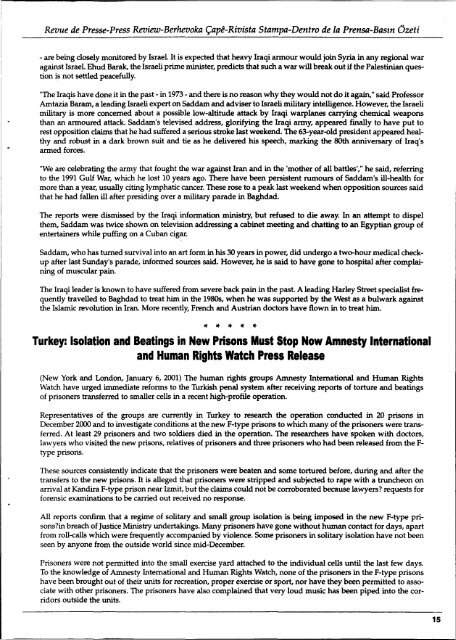Bulletin de liaison et d'information - Institut kurde de Paris
Bulletin de liaison et d'information - Institut kurde de Paris
Bulletin de liaison et d'information - Institut kurde de Paris
You also want an ePaper? Increase the reach of your titles
YUMPU automatically turns print PDFs into web optimized ePapers that Google loves.
Revue <strong>de</strong> Presse-Press Review-Berhevoka Çapê-Rivista Stampa-Dentro <strong>de</strong> la Prensa-Basm Öz<strong>et</strong>i<br />
- are being closely monitored by Israel. It is expected that heavy Iraqi armour would join Syria in any regional war<br />
against Israel. Ehud Barak, the Israeli prime minister, predicts that such a war will break out if the Palestinian question<br />
is not s<strong>et</strong>tled peacefully.<br />
"The Iraqis have done it in the past - in 1973 - and there is no reason why they would not do it again," said Professor<br />
Amtazia Baram, a leading Israeli expert on Saddam and adviser to Israeli military intelligence. However, the Israeli<br />
military is more concerned about a possible low-altitu<strong>de</strong> attack by Iraqi warplanes carrying chemical weapons<br />
than an armoured attack. Saddam's televised address, glorifying the Iraqi army, appeared finally to have put to<br />
rest opposition claims that he had sUffered a serious stroke last weekend. The 63-year-old presi<strong>de</strong>nt appeared healthy<br />
and robust in a dark brown suit and tie as he <strong>de</strong>livered his speech, marking the 80th anniversary of Iraq's<br />
armed forces.<br />
"We are celebrating the army that fought the war against Iran and in the 'mother of all battles'," he said, referring<br />
to the 1991 Gulf War, which he lost 10 years ago. There have been persistent rumours of Saddam's ill-health for<br />
more than a year, usually citing lymphatic cancer. These rose to a peak last weekend when opposition sources said<br />
that he had fallen ill after presiding over a military para<strong>de</strong> in Baghdad.<br />
The reports were dismissed by the Iraqi information ministry, but refused to die away. In an attempt to dispel<br />
them, Saddam was twice shown on television addressing a cabin<strong>et</strong> me<strong>et</strong>ing and chatting to an Egyptian group of<br />
entertainers while puffing on a Cuban cigar.<br />
Saddam, who has turned survival into an art form in his 30 years in power, did un<strong>de</strong>rgo a two-hour medical checkup<br />
after last Sunday's para<strong>de</strong>, informed sources said. However, he is said to have gone to hospital after complaining<br />
of muscular pain.<br />
The Iraqi lea<strong>de</strong>r is known to have suffered from severe back pain in the past. A leading Harley Stre<strong>et</strong> specialist frequently<br />
travelled to Baghdad to treat him in the 1980s, when he was supported by the West as a bulwark against<br />
the Islamic revolution in Iran. More recently, French and Austrian doctors have flown in to treat him.<br />
.. .. .. .. ..<br />
Turkey: Isolation and Beatings in New Prisons Must Stop Now Amnesty International<br />
and Human Rights Watch Press Release<br />
(New York and London, January 6,2(01) The human rights groups Amnesty International and Human Rights<br />
Watch have urged immediate reforms to the Turkish penal system after receiving reports of torture and beatings<br />
of prisoners transferred to smaller cells in a recent high-profile operation.<br />
Representatives of the groups are currently in Tur~ey to research the operation conducted in 20 prisons in<br />
December 2000 and to investigate conditions at the new F-type prisons to which many of the prisoners were transferred.<br />
At least 29 prisoners and two soldiers died in the operation. The researchers have spoken with doctors,<br />
lawyers who visited the new prisons, relatives of prisoners and three prisoners who had been released fromthe F-<br />
type prisons.<br />
These sources consistently indicate that the prisoners were beaten and some tortured before, during and after the<br />
transfers to the new prisons. It is alleged that prisoners were stripped and subjected to rape with a truncheon on<br />
arrival at Kandira F-type prison near Izmit, but the claims could not be corroborated because lawyers? requests for<br />
forensic examinations to be carried out received no response.<br />
All reports confirm that a regime of solitary and small group isolation is being imposed in the new F-type prisons?in<br />
breach of Justice Ministry un<strong>de</strong>rtakings. Many prisoners have gone without human contact for days, apart<br />
from roll-ca11swhich were frequently accompanied by violence. Some prisoners in solitary isolation have not been<br />
seen by anyone from the outsi<strong>de</strong> world since mid-December.<br />
Prisoners were not permitted into the small exercise yard attached to the individual cells until the last few days.<br />
To the knowledge of Amnesty International and Human Rights Watch, none of the prisoners in the F-type prisons<br />
have been brought out of their units for recreation, proper exercise or sport, nor have they been permitted to associate<br />
with other prisoners. The prisoners have also complained that very loud music has been piped into the corridors<br />
outsi<strong>de</strong> the units.<br />
1S
















